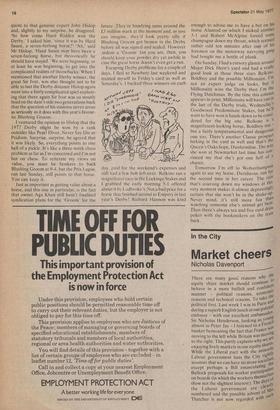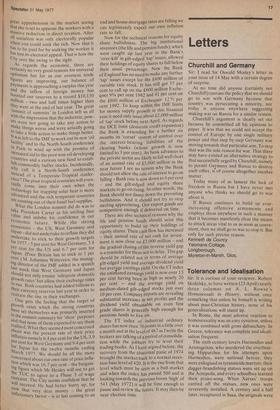11111111MMI■1■11.■1■11 01111.1. In the City
Market cheers
Nicholas Davenport
There are many good reasons why the equity share market should continue t° behave in a more bullish and confident manner political reasons, econonlic reasons and technical reasons. To take Ode political first. Last week I was in Paris during a superb English lunch at our palatial embassy with our excellent ambassador, Sir Nicholas Henderson, looking as Yuntifi almost as Peter Jay I listened to a Frenc banker bemoaning the fact that France vil.as lmoving to the left while Britain was niluvi to the right. This partly explains why we ar enjoying lively markets in our equity share5" While the Liberal pact with the minoritY Labour government lasts the City righ.tIY assumes that we can have no more socialis'
" except perhaps a Bill emasculating t0
Bullock proposals for worker participati°5 on boards (in which the workers themselvef show not the slightest interest). The daYs the Labour government are cleaq numbered and the possible advent of 071 Thatcher is not now regarded with _sue
great apprehension in the market seeing that she is set to appease the workers with a massive reduction in direct taxation. After all socialism was only electorally popular When you could soak the rich. Now that it has to be paid for by soaking the worker it has lost its electoral appeal. That is how the City sees the swing to the right.
As regards the economic, there are Certainly no very good reasons for universal optimism but for us our overseas trade figures are improving, our balance of Payments is approaching a surplus this year and the inflow of foreign money has boosted our reserves to a record $10,130 million two and half times higher than they were at the end of last year. The great 'summit of summits' in London left us all with the impression that the industria; powers were not going to take any action to make things worse and were actually going to take a little action to make things better. It was left to the IMF to work out its new 'oil facility' and to the North-South conference in Paris to wind up with the promise of Increased aid to the poor non-oil developing countries and a curious new fund to establish commodity buffer stocks. Incidentally, Why call it a North-South conference Instead of a Temperate-Tropical conference? The poor tropical countries will eventually come into their own when the technology for trapping solar heat is more advanced and the rich temperate countries are running out of their fossil fuel supplies. What the London summit did do was to take President Carter at his smiling face Value and imbibe his confidence in our economic future. While the strong economies the US, West Germany and Japan -did not undertake to reflate they did undertake to stick to their growth targets for 1977 -5 per cent for West Germany, 5.8 Per cent for the US and 6.7 per cent for Japan, (Poor Britain has to stick to 1 per Ferlt• ) M. Johannes Witteveen, the managI,ng director of the IMF added in a speech last week that West Germany and Japan should not only ensure 'adequate domestic growth rates' but allow their exchange rates to rise. Both countries had added billions to their currency reserves last year in order to restrain the rise in their exchanges. °Ile gets the feeling that the target of rowth rates which the strong countries set themselves was primarily inserted m the summit summary for 'show' purposes and that none of them expected to see them realised. What they seemed most concerned bout was the present rate of their price Inflation namely 6.4 per cent for the US, 3.9 Per cent for West Germany and 9.4 per cent or Japan for the twelve months ending March 1977. We should be all the more COI-teemed about our own rate of price inflation which was 16.7 per cent the bargaining figure which Mr Healey will use to get the TUC to agree to a Phase 3 of wage restraint. The City seems confident that he will succeed. He had better hurry up, for now that very dear money the great Inflationary factor is at last coming to an
end and house mortgage rates are falling we can legitimately expect our own inflation rate to fall.
Now for the technical reasons for equity share bullishness. The big institutional investors (the life and pension funds), which were caught up last year in the Bank's 'over-kill' in gilt-edged 'tap' issues, allowed their holdings of equity shares to fall below their usual percentage. Now the Bank of England has no need to make any further 'tap' issues except for the £400 million of variable rate stock. It has still got 57 per cent to call up on the £800 million Exchequer 91/4 per cent 1982 and 41 per cent on the £800 million of Exchequer 12½ per cent 1992. To keep within the IMF limits for money supply growth in this financial year it need only issue about £2,000 million of 'tap' stock before next April. As regards the DCE limit (domestic credit expansion) the Bank is extending for a further six months its 'corset' system of control over the interest-bearing liabilities of the clearing banks (whose growth is now limited to 3 per cent). As bank advances to the private sector are likely to fall well short of an annual rate of £3,000 million in the near future I see no reason why the Bank should not allow the rate of interest to go on falling Bank rate is now down to 8 per cent and the gilt-edged and equity share Markets to go on rising. In other words, the Bank should not damp down the prevailing bullishness. And it should not try to stop sterling appreciating. Our export goods are competitive enough if delivered on time.
There are also technical reasons why the life and pension funds should seize this opportunity to build up their holdings of equity shares. Their cash flow has increased their annual rate of net cash for investment is now close on £3,000 million and the gradual closing of the reverse yield gap is a reminder for them not todelay. This gap should be related not in terms of average gilt-edged yield and average dividend yield but averege earnings yield. On the FT index the estimated earnings yield is now over 13 per cent having been as high as nearly 20 per cent — and the average yield on medium-dated gilt-edged stocks just over 10 per cent. Company reports are revealing substantial increases in net profits and the dividend yield obtainable on even first grade shares is generally high enough for pensions funds to live on.
The FT index of industrial ordinary shares has now risen 70 points in a little over a month and at the level of 467 as I write the brokers are talking of a period of consolidation while the jobbers try to level their trading books. As I have argued before, the recovery from the abnormal panic of 1974 brought the market back to a normal recession base level of 420. It is the rise from that level which must be seen as a bull market and when the index has passed 500 and is looking towards the previous boom 'high' of 543 (May 1972) it will be time enough to pause and review the future. It may then be near election time.



































 Previous page
Previous page